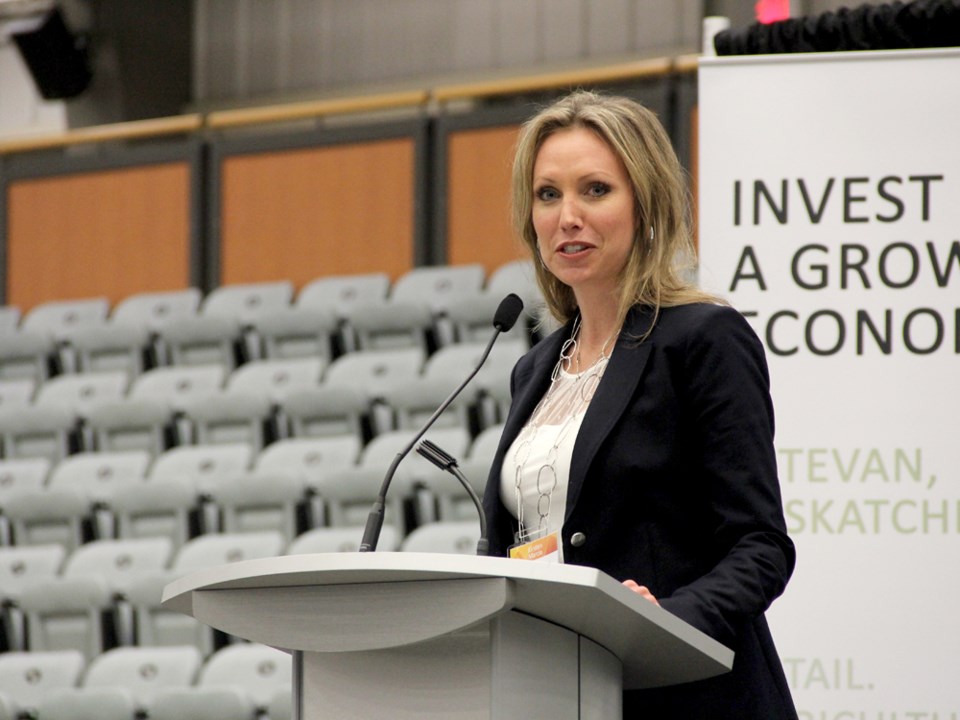The DEEP Geothermal project in Saskatchewan should be easier to sell in Estevan and Calgary than Toronto’s Bay Street. At least that’s the assumption the project’s promoter is making as she finds herself embedded in the second phase of an exciting electrical production program near Estevan.
Kirsten Marcia, a graduate of Estevan Comprehensive School, who holds degrees in geological engineering, sees the Deep Earth Energy Production (DEEP) project as one that local and Calgary-based oil patch and other production people should be able to understand and quickly embrace as doable. It would probably take a little longer to explain the intricacies to the Bay Street crowd who might not “get it,” as quickly as the oil patch teams do, she suggested.
Marcia and her Saskatoon-based team are focusing their attention on southeast Saskatchewan because that’s where the homework has already been completed, and the stars align perfectly.
Preliminary work has absorbed about $2 million in capital spending with $1 million coming from the province.
“I see $5 million as the key that unlocks this project,” Marcia said, noting that with so many factors already in place, the investment community in and around these two oil hotbeds should be anxious to get involved in a pilot power production plant that will leave zero environmental footprint, while producing at least five megawatts of electricity for the provincial grid for years to come.
The payback time line is longer than what an oil well investor would generally realize, but the cash flow will last a whole lot longer, she explained.
“The typical oil well has a pretty quick pay back, but the production value also declines relatively quickly.
“It’s just the opposite for thermal. Investment payback is slower, but much more sustainable with escalator clauses to reflect inflation. The original payback for an investor would be about five years, then it keeps on paying for decades.
“If we raise the $5 million, we don’t have to go back to the market for funding. I also realize that funding is a challenge for junior companies, whether it be oil or any other resource-based company,” Marcia said.
The $5 million will trigger other supportive funding that will get the first plant built and operational in fairly rapid order.
Using the geothermal heat/power found 2,300 metres under the surface to produce electricity is not new technology. It’s over 60 years old. The fact that all the elements to pull it off are in southeast Saskatchewan, is simply ideal.
“We drill through the gas and oil zones. We gain more information for the oil patch,” she said. “Heated frack water, also very interesting. We can use the waste heat in the community, 40 per cent of the 65 degree heated water out of the plant can be used to heat a 20-acre greenhouse if you want. No need to pipe in anything. Electricity is produced, so there is no market fluctuation. The price (income) is steady. And as we said earlier, there are no negative environmental impacts. The power plant itself is small and can be built using off the shelf material,” Marcia said. The geological work has already been done thanks to 70 years of seismic and oil drilling work in this region.
“It’s just like farming would have been 120 years ago. They set up where it was obvious to set up. We have an obvious place to set up and it’s just outside Estevan,” she said.
A couple of sites have already been identified and a follow up seismic program will determine the best one by the end of this year.
“It’s just a matter of getting this first one built and operating and getting a basic power supply into the grid where they need it … again, that would be in southeast Saskatchewan,” she said.
Marcia will be in Estevan this week to speak with prospective investors. She noted that the old adage of being first in, translates into ongoing advantages going forward, such as holding majority shares in the company’s DEEP program as it matures into more power plants that will be capable of pumping out electrical power on a cost competitive scale for decades … or longer.
“The best geothermal source in Canada is right here in southeast Saskatchewan. We have a supportive government behind the project. We will be providing base load electrical power into the nearby grid system, and it’s being done in an already explored area, so there are no surprises, no regulatory hurdles because it’s environmentally friendly."
The long range plan is to provide hundreds of megawatts of electrical power for the provincial system, which should blend in perfectly with the established power production and electrical grid system within a friendly regime.




